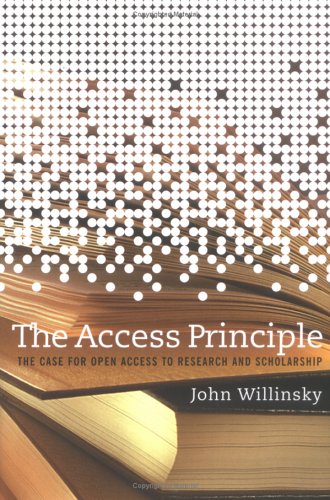 John Willinsky’s The Access Principle: The Case for Open Access to Research and Scholarship (2006) was the first book published on open access (that I am aware of, anyway). I remember reading it sometime around 2008 and it’s certainly had a profound influence on my thinking about the dissemination of research.
John Willinsky’s The Access Principle: The Case for Open Access to Research and Scholarship (2006) was the first book published on open access (that I am aware of, anyway). I remember reading it sometime around 2008 and it’s certainly had a profound influence on my thinking about the dissemination of research.
Willinsky states the principle in his introduction (p. xxi):
A commitment to the value and quality of research carries with it a responsibility to extend the circulation of such work as far as possible and ideally to all who are interested in it and all who might profit from it.
Willinsky’s deep understanding of the history and philosophy of openness is apparent throughout, from Aristotle (“All humankind by nature desires to know”) to economist Fritz Machlup’s concept of knowledge as a near-perfect public good. As with his published articles, a few of which I sketched in the previous post, The Access Principle is remarkable for its multifaceted approach. Each chapter covers a different aspect of open access, including copyright, scholarly societies, economics, development, and indexing, to name a few. In addition, there are six short appendices on such topics as the varieties of open access, journal management economics, and journal metadata.
In Chapter 8 (“Public”) Willinsky responds to those who question the public’s interest in published research (p. 125):
… proving that the public has sufficient interest in, or capacity to understand, the results of scholarly research is not the issue. The public’s right of access to this knowledge is not something people have to earn. It is grounded in a basic right to know.
Willinsky has repeatedly asserted this right to know in his writings, and devotes a chapter to it in The Access Principle (“Rights,” pp. 143-154). In the first paragraph he states (p. 143):
The right to know that is inherent in the access principle has a claim on our humanity that stands with other basic rights, whether to life, liberty, justice, or respect. More than that, access to knowledge is a human right that is closely associated with the ability to defend, as well as to advocate for, other rights.
Willinsky proceeds by examining the political scientist Richard Pierre Claude’s work on science and human rights, as well as Jacques Derrida on the right to philosophy and its importance to the humanities. The right to know “is about having fair and equitable access to a public good” and it is the responsibility of researchers to “ensure that there are no unwarranted impediments” to information. Willinsky cites Derrida’s independent questioning of everything and adds that it doesn’t make any sense that this independent questioning would be closed off to those outside academia (p. 148, 153):
If the independent university is to profess an “unlimited commitment to the truth,” as Derrida puts it, it must at some point be concerned with an unimpeded right of access to that truth.
…..
How are we to ensure the university’s contribution to a fairer world, if access to the research it produces about the world is itself a source of inequality… ?
While Peter Suber’s excellent and more recent Open Access focuses on the details of how open access works (or should work) today, The Access Principle provides a broader rationale for open access. While the open access numbers have changed in the seven years since its publication, this book conveys ideas that have not lost any power.
The Access Principle is available online and can also be found in Newman Library.
